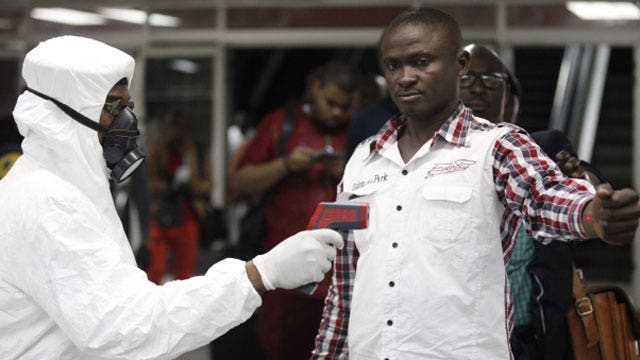Major airports to screen passengers amid Ebola concerns
Leland Vittert report from Dulles International Airport
Only 20% of the country has a “great deal” of confidence that the federal government will be able to prevent a widespread Ebola outbreak here in the United States, according to recent Pew poll.
This is not so surprising. Over the past several years the country has been treated to a long-running episode of the Keystone Cops, with one federal agency after another displaying incompetence or worse.
We have seen mistakes and misdeeds – policy issues aside -- from (among others) the Veterans Administration, the Justice Department, the NSA, the Government Services Administration, Homeland Security, the IRS, and Health and Human Services. Intruders barging into the White House, the horrific roll-out of the ObamaCare website, tens of thousands of children massing on our border – the faith in government is evaporating.
[pullquote]
Whence this sorry saga? It starts at the top, with a commander in chief who is disengaged, oblivious to the priorities of the nation, and whose management skills may possibly allow him to pack for an overnight trip – but not much more.
Republicans should hope that the upcoming midterm elections – and the presidential race in 2016 -- becomes a referendum on President Obama’s job performance.
The only good that can come from the sorry litany of the past six years is this: Americans need to understand that a successful president requires more than a telegenic smile and catchy sound bites. It is the hardest job in the world; only the most capable should apply.
Is the government just too big to manage? Yes, of course it is too big, but in addition -- today it is being badly run. In a recent poll, 42% of Americans said they thought Mitt Romney would be doing a better job than President Obama had he won office.
That less than half the country responded in this fashion suggests this: people gravely underestimate the importance of excellent management skills.
Romney lost the 2012 election in part because he never persuaded Americans that his excellent resume -- stuffed with outstanding accomplishments in both the private sector and in various public capacities -- would make much difference to the course of the country.
Instead, Romney’s achievements were mocked by fearful Democrats – opponents who secretly may have agreed with Bill Clinton’s reputed assessment of Obama as “the amateur.”
No one expects the president to have his thumb on every gear of government. It is indeed huge and too intricate for one person to oversee in any detail. But, so is JP Morgan Chase, with its 260,000 employees and operations in 60 countries. And yet we hold Jamie Dimon accountable for trading losses in London, cyber attacks on customers and hiring practices in Beijing.
Why?
Because the person at the top sets the tone, establishes the standards – determines how to impose his values on an organization and how to penalize those who don’t measure up.
As an analyst on Wall Street some years ago, I tried to sort out winners from losers among the oilfield companies I followed. The starting point was always top management. There were companies – like Schlumberger – known to consistently hire capable and smart executives; that talent level permeated the organization. There were others, which shall remain nameless, that were equally steeped in mediocrity. Which would you rather invest in?
President Obama has set the tone by treating the duties of office casually whether it’s missing 58% of his national security intelligence briefings, half-heartedly returning a Marine’s salute or flipping off to the golf course in the midst of harrowing events. He also fails to hold others accountable.
It is true that some especially dismal performers are no longer in place – Julia Pierson at the Secret Service, Eric Shinseki, responsible for the scandalous Veterans Administration and Health czar Kathleen Sebelius, who oversaw the catastrophic roll-out of ObamaCare, come to mind – but none was fired. Rather, they were allowed to retire with pensions, if not reputations, fully in place. Occasionally, someone needs to be given the boot.
Part of the problem has been that political considerations have often trumped capability in selecting appointments to high positions.
Kathleen Sebelius, for instance, was a controversial hire because of her mismanagement of health insurance operations in Kansas. She was responsible for slapping endless mandates on insurers in that state, which ultimately drove many out of Kansas and left thousands without insurance. But, she was an early supporter of the president.
Shinseki was a retired Army Chief of Staff who earned plaudits from the left for his criticism of President George W. Bush’s handling of the Iraq war.
Julia Pierson was the first female to head the Secret Service; she was appointed in part to change the agency’s image in the wake of a prostitution scandal. At the time of her appointment, “some agents interviewed about the top contenders for the job told the Washington Post… that Pierson was considered a weak candidate among rank-and-file agents because she had spent relatively little time supervising or working high-priority protective details, spending most of her career in administrative jobs.”
The head of the Center for Disease Control and Prevention, Dr. Thomas Frieden, reassured Americans several days ago that his agency would stop the spread of Ebola in the U.S. “in its tracks…because we've got infection control in hospitals and public health that tracks and isolates people if they get symptoms."
Okay, that sounds good but it appears that several failures of those systems resulted in several people in Dallas coming (and remaining) in contact with Thomas Eric Duncan, the Liberian man who just died from the disease.
Let us hope that the country’s nervousness proves ill founded, and that the Obama administration proves efficient and capable. Given the record, maybe we should all invest in haz-mat suits.









































